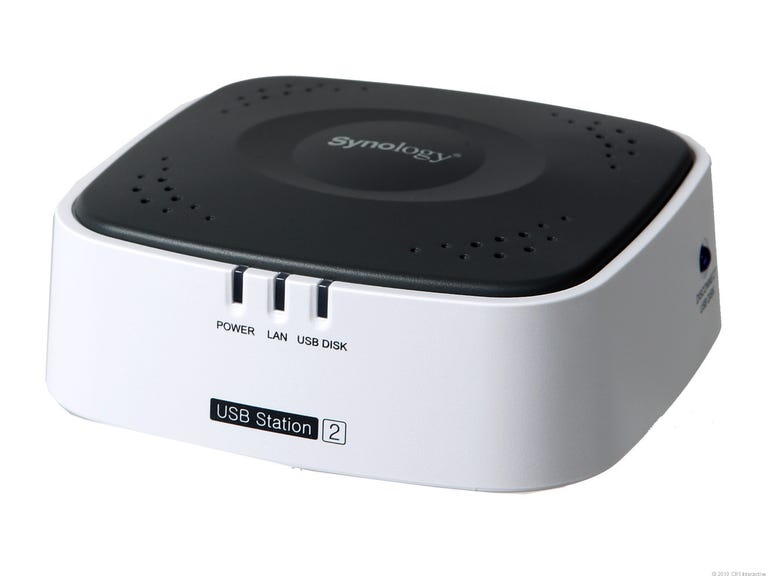 Why You Can Trust CNET
Why You Can Trust CNET Synology USB Station 2 review: Synology USB Station 2
Synology USB Station 2
If you have a few external hard drives that are full of data and want to quickly share them via your network, the Synology USB Station 2 is for you. This little device gives you a taste of what it's like to have one of Synology's full-featured NAS servers, which generally come with a vast number of features and an incredibly intuitive Web interface to manage them.
The Good
The Bad
The Bottom Line
Unlike other NAS servers from Synology, however, the USB Station 2 fails where it matters the most: its performance is the slowest among its peers. For a price of around $150, the USB Station 2 is also comparatively expensive. Nonetheless, it's a nice device to have, especially for those who want to be familiar themselves with advanced features in case they want to upgrade to a full-featured Synology NAS server later.
If a USB hard-drive network storage host device is what you need, we'd also recommend the Iomega iConnect.
Design and setup
Fitting right in your hand, the USB Station 2 is one of the smallest USB network storage host devices we've seen. The iConnect, which was the most compact device we'd seen until now, has about a 50 percent larger footprint. Not surprisingly, the Synology has only two USB ports, whereas the iConnect has four.
The number of USB ports translates into how many external hard drives or printers the device can host at a time. With external hard drives offering up to 3TB apiece lately, such as the Seagate FreeAgent GoFlex Desk, this means the USB Station 2 can host up to 6TB of storage, which is substantial.
On the front, the little device has three LED status lights that indicate power, the connection, and the hard drive's activities. On the back, are the two USB ports, a Gigabit Ethernet port, and the power connector.
Setting it up was rather simple. Like all NAS servers from Synology, the USB Station 2 comes with a CD that contains the Synology Assistant software. Once installed on a connected computer, the software helps detect the NAS server, map share folders onto the network drive, and launch the Web interface, which you can use to further customize the device.
Once an external hard drive is plugged into the NAS' USB port, it will be automatically turned into a public share folder that anybody in the network can access. You can later restrict access by using the device's Web interface.
As the server supports both Mac and PC platforms really well, in order to turn a USB external hard drive into a NAS server all you have to do is plug it into the USB Station 2, connect the station to the network using its Ethernet port, and turn it on. Now it will be automatically detected by both Windows and Mac OSes.
Features
The USB Station 2 doesn't have as many advanced features--such as the Surveillance Station, Photo Station, or the ability to handle RAID configurations--as do full-size NAS servers from Synology, like the DiskStation DS410. Nonetheless it has plenty of other features and also supports Apple's Time Machine.
The two features that you wouldn't expect to find in a NAS of its size, but that you will find here, are the ability to stream digital content to all UPnP- and DLNA-compliant streamers, and a Download Station that allows for PC-less downloading.
The USB Station 2's Download Station allows the server to download files from the Internet by itself and to download files from Web sites that require authentication (such as RapidShare). It also supports BitTorrent file-sharing services. You can manage your download anytime from anywhere via the local network or the Internet. This is an excellent feature for those who want to download large files, as no computer needs to be running, other than the NAS server itself, during the downloads.
If you want access to the NAS server's storage via the Internet, the USB Station 2 also has a feature called File Station. Before you can access it via the Internet, however, you'll first need to set up a dynamic domain name system (DDNS) connection. The USB Station 2 supports a long list of free DDNS hosts, and you can even register for an account from within its Web interface.
Once set up, the File Station allows you to access data from the NAS server's share folder over the Internet. You can download a single file or a whole folder to the remote computer, and you can also upload files to the NAS server. Multiple users can use this feature at a time, from different locations.
The USB Station 2 uses Synology's Disk Station Manager, which offers an excellent Web interface; it works very much like the interface of an operating system, such as Windows or Linux.
Performance
To our disappointment, the USB Station 2 didn't deliver when it comes to performance. We tested it with multiple USB external hard drives, and its performance was consistently below our expectations with just 55.1Mbps and 99.6Mbps for write and read, respectively.
To put this in perspective, the DiskStation DS410, a full-size NAS server from Synology, scored 279Mps for write speeds and 422.6Mbps for read speeds.
(Longer bars indicate better performance)
| Read | Write |
Service and support
Synology backs the USB Station 2 with a two-year warranty from the date of purchase. Phone tech support is available Monday through Friday from 9 a.m. to 5 p.m. PT. At its Web site, you can find Synology's forum, download software and the latest firmware, and get more information about its products from a Wiki page.



